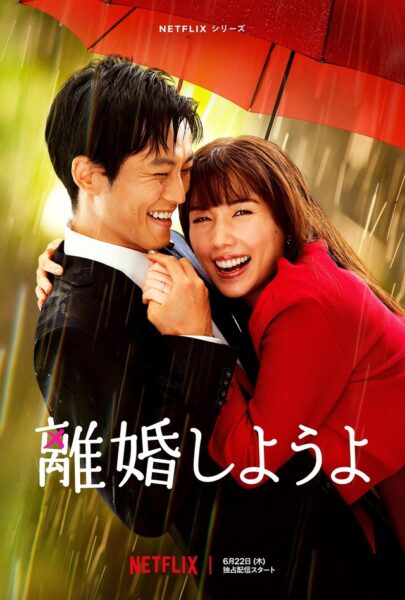Sheltered third generation politician Taishi Shoji (Tori Matsuzaka) and wildly successful actress Yui Kurosawa (Riisa Naka) can no longer stand each other and want to get a divorce, but their high profile life makes it extremely difficult to do so on top of the usual headaches and complications of a separation.
Netflix’s “Let’s Get Divorced” is a dramatic comedy that starts off with the usual family politics over a divorce, exacerbated by their lives in the public eye and their respective career paths. I started watching this Netflix produced Japanese drama not expecting much, hoping to learn some new Japanese vocabulary about politics in a lighthearted show, but I was actually quite invested in the characters by the end and found the ways in which both the wife and husband developed rather refreshing. The couple each come to terms with who they are as people in their own way and start to learn what they really want from life and from themselves.
If such a category existed, I would classify this story as a coming of middle age story. The classic coming of age story usually follows a child who matures and moves towards adulthood with some life changing experience or some epiphany or insight that alters their understanding of themselves and the world, but of course, we often overlook the development of naive young adults who are still flailing in the early stages of their adulthood and then carry the burdens of their missteps as young adults through the rest of their lives. I imagine anyone who’s gone through some relationship changes in their marriage or even divorce could find this story very relatable.
Aside from the human condition, “Let’s Get Divorced” did in fact help me make some progress in my Japanese language learning while at the same time giving me some insight into the way politics works in democratic Japan, of course with the caveat understanding that this is dramatic fiction, not real life.
In terms of comedy, I definitely found certain situations and jokes amusing, and actually it was the supporting characters that made me laugh the most, especially Yui’s lawyer and manager. Of course, there are culture specific comedy and contexts that may not make sense to outsiders to the society, and generally, Japanese dramas tend to target only Japanese audiences unlike some Asian dramas in other countries that are made with international audiences in mind. I’ve been immersed in Japanese film and TV for the last couple of years to learn the language, so there may be some jokes that I now “get” that I wouldn’t have been privy to before studying the language and culture in more detail. However, as a Netflix specific production, this one does have American production elements and flavors dashed in here and there, so it still should be amusing enough to a broader Western audience.
There is also some social commentary on the role of marriage and of women in Japan, and the ending really crosses the t’s and dots the i’s on making a statement on a new vision for gender roles and relationships in the latest more progressive Reiwa era of Japanese society.









